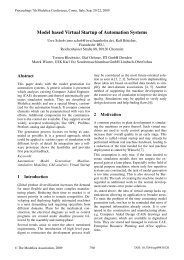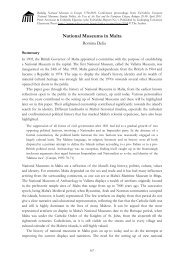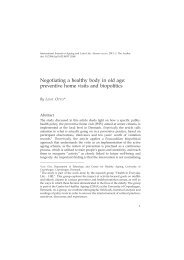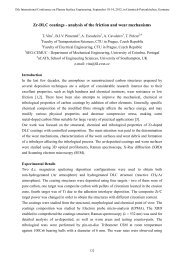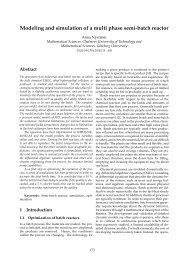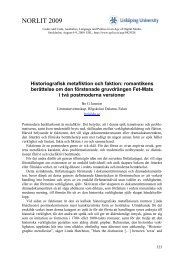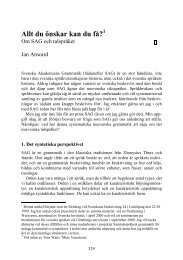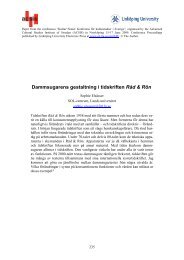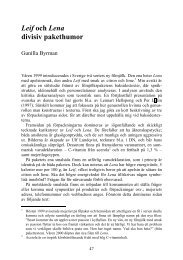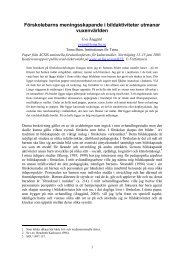Social-ecological systems
Social-ecological systems
Social-ecological systems
You also want an ePaper? Increase the reach of your titles
YUMPU automatically turns print PDFs into web optimized ePapers that Google loves.
Adaptability and Transformability<br />
for Resilience of<br />
<strong>Social</strong>-Ecological Systems?<br />
Carl Folke<br />
Centre for Transdisciplinary Environmental Research (CTM)<br />
and Department of Systems Ecology, Stockholm University<br />
and<br />
Resilience Alliance
<strong>Social</strong>-<strong>ecological</strong> co-evolution<br />
Anthropocene – a biosphere<br />
shaped by humanity<br />
Photos: C.Folke and N.Kautsky<br />
• Throughout history<br />
humanity has shaped<br />
nature and nature has<br />
shaped the development<br />
of human society<br />
• <strong>Social</strong>-<strong>ecological</strong> coevolution<br />
now takes place<br />
also at the planetary level<br />
and at a much more rapid<br />
and unpredictable pace<br />
than previously in human<br />
history<br />
e.g. Steffen et al. 2004.<br />
Global Change and the Earth System:<br />
A Planet Under Pressure<br />
Springer-Verlag, Berlin
Pollination<br />
Ecosystem services<br />
Water filtering<br />
Fish production<br />
Vi behöver naturen<br />
Carbon sinks<br />
Climate connection<br />
Climate connection<br />
Seed dispersal<br />
Photos C. Folke
Resilience<br />
• Sustainable use of ecosystem services<br />
(incl. food production) requires resilient<br />
eco<strong>systems</strong> and associated governance<br />
<strong>systems</strong>
Resilience<br />
The capacity of a<br />
system to absorb<br />
disturbance and<br />
yet still retain<br />
essentially the<br />
same function,<br />
structure identity,<br />
and feedbacks<br />
www.resalliance.org
Human-driven erosion of resilience<br />
• impacting on ecosystem via emissions of waste,<br />
pollutants and climate change<br />
• removing biological diversity, whole functional<br />
groups of species or whole trophic levels<br />
• altering the magnitude, frequency and duration<br />
of disturbance regimes<br />
The combined effects of those pressures makes<br />
social-<strong>ecological</strong> <strong>systems</strong> more vulnerable to<br />
changes that previously could be absorbed<br />
Folke, Carpenter, Walker, Scheffer, Elmqvist, Gunderson, Holling. 2004.<br />
Ann.Rev.Ecol.Evol.Syst.35: 557-581
Erosion of resilience<br />
• increases the likelihood for ecosystem<br />
shifts<br />
from desired to less desired states in their<br />
capacity to generate natural resources and<br />
ecosystem services<br />
Impacts on livelihood and societal<br />
development<br />
Scheffer et al. 2001. Nature<br />
Bellwood et al. 2004. Nature
From grazing land to shrub-bushland<br />
Desirable<br />
Undesirable<br />
Photos D. Tongway Folke et al. 2002. Ambio
Savannization of tropical forests<br />
Desirable Undesirable<br />
Photos C. Folke
Regime shifts in lake eco<strong>systems</strong><br />
oligotrophic (clear) eutrophic (turbid, dense algae)<br />
Desirable Undesirable<br />
Photos S. Carpenter Folke et al. 2002. Ambio
Adaptability and Transformability<br />
• ADAPTABILITY is the capacity of people in a<br />
social-<strong>ecological</strong> system to manage resilience<br />
through collective action<br />
• TRANSFORMABILITY is the capacity of people<br />
in a social-<strong>ecological</strong> system to create a<br />
fundamentally new SES when <strong>ecological</strong>,<br />
political, social or economic conditions make the<br />
existing system untenable<br />
Walker et al. 2004. Ecology and Society
<strong>Social</strong>-<strong>ecological</strong> <strong>systems</strong><br />
• Loss of ecosystem resilience does not<br />
imply a vulnerable social-<strong>ecological</strong><br />
system<br />
• A good governance system does not imply<br />
a resilient social-<strong>ecological</strong> system<br />
Bodin and Norberg, 2005. Environmental Management;<br />
Huitric. 2005. Ecology and Society
Landscape governance and <strong>Social</strong>-<br />
Ecological Systems<br />
• Build knowledge and<br />
understanding of<br />
ecosystem dynamics<br />
• Develop management<br />
that interpret and respond<br />
to environmental<br />
feedback<br />
• Support the emergence<br />
of flexible organizations<br />
and institutions and<br />
adaptive governance of<br />
ecosystem processes<br />
Berkes and Folke 1998. Linking volume; Berkes, Colding, Folke. 2003. Navigating volume
Lake Racken Catchment, Sweden<br />
Local <strong>ecological</strong> knowledge and institutional<br />
dynamics for ecosystem management<br />
Olsson and Folke 2001. Eco<strong>systems</strong>
Building capacity to adapt to change<br />
Lake Racken Catchment Management<br />
Crises<br />
• Acidification<br />
• Fish disease<br />
• Overexploitation<br />
Responses<br />
• Generation of <strong>ecological</strong> knowledge, monitoring and<br />
management practices from the species to the watershed level<br />
• Local self-organization from liming group to fisheries<br />
association<br />
• Shared management, exchange of experience between local<br />
steward associations and collaboration with municipality,<br />
county and other organizational and institutional levels<br />
Photo P. Olsson<br />
Olsson and Folke 2001. Eco<strong>systems</strong>
Adaptive co-management <strong>systems</strong><br />
• relies on the collaboration of a diverse set of<br />
stakeholders operating at different levels, often<br />
in networks, from local users, to municipalities,<br />
to regional and national organizations, and also<br />
international bodies<br />
• sharing of management power and responsibility<br />
may involve multiple institutional linkages among<br />
user-groups or communities, government<br />
agencies, and non-governmental organizations<br />
Olsson, Folke, Berkes. 2004. Environmental Management
Kristianstads Vattenrike –<br />
A <strong>Social</strong>-Ecological Transformation<br />
Photo. P. Olofsson<br />
Olsson, Folke, Hahn. 2004. Ecology and Society
Kristianstad Vattenrike<br />
http://www.vattenriket.kristianstad.se/
Creating a shared vision<br />
• Perceived <strong>ecological</strong> crises - overgrowth<br />
of marsh lands, loss of wildlife, threats<br />
from increased flooding, ground and river<br />
water quality etc.<br />
• Perception -from ’water sick’ to ’water rich’<br />
area<br />
• World view - humans a part of and not<br />
apart from the land (cultural landscape)
Preparing the system for change<br />
• Bottom-up initiative -’stewards of the land’, local selforganization<br />
• Generating <strong>ecological</strong> knowledge of the landscape/<br />
catchment (science, experience, practice, innovation)<br />
• Forming collaboration networks and support networks<br />
(local, regional, national and also international)<br />
• Developing a comprehensive framework with visions<br />
and goals for a new management approach<br />
• Perceived crisis opened up a trajectory to reduce<br />
resilience of the undesired state of the landscape<br />
(break down structures that constrain adaptability)
Using a window-of-opportunity<br />
• Shift in political power and people at the<br />
municipality level<br />
• Local politicians impressed by the selforganization,<br />
broad vision presented with<br />
potential for regional development<br />
• Ecomuseum Kristianstads Vattenrike (EKV)<br />
was created – a ‘bridging organization’ – within<br />
the existing institutions, with the role to initiate<br />
and coordinate projects
Transformation of the social-<strong>ecological</strong> system<br />
Declining values<br />
Perceived by individuals<br />
Preparing the system<br />
for change<br />
Olsson, Folke, Hahn. 2004. Ecology and Society
Making the new system resilient<br />
Picture by S-E. Magnusson<br />
• Fostering motivation and<br />
values for ecosystem and<br />
landscape management<br />
• Directing the local context<br />
through adaptive<br />
collaborate management<br />
and collective action<br />
• Navigating the larger<br />
environment<br />
Olsson, Folke, Hahn. 2004. Ecology and Society
Photo C. Folke<br />
Strengthening adaptability<br />
• The social capacity to<br />
respond to ecosystem<br />
change has increased<br />
• Trust-building through<br />
dialogue has been crucial,<br />
social networks have<br />
emerged slowly,<br />
organically face-to-face<br />
• Collaborative learning for<br />
landscape management<br />
thrives under informal<br />
networks in multi-level<br />
governance<br />
Hahn, Olsson, Folke, Johansson, in revision. Human Ecology
Leaders and Stewards<br />
Stewards of<br />
Kristianstads Vattenrike<br />
Photo C. Folke<br />
• serve as key players in<br />
social networks,<br />
institution building, and<br />
organizational change<br />
• facilitate horizontal and<br />
vertical linkages<br />
• provide vision, sense<br />
making, conflict<br />
resolution and build<br />
trust in the adaptive comanagement<br />
process<br />
Olsson, Folke, Hahn. 2004. Ecology and Society
Conclusions<br />
• Resilience is required to absorb change<br />
• Transformability is required to move into a<br />
more desired social-<strong>ecological</strong> trajectory<br />
• Adaptability among actors is required to<br />
reinforce and sustain desired social<strong>ecological</strong><br />
states
Conclusions<br />
• Not top down or bottom up, but collaborative<br />
and flexible, cross-level governance<br />
• Within existing legal and institutional framework<br />
• Stakeholder mobilization before new conflicts<br />
• Leadership and stewards, trust, dialogue,<br />
informal institutions<br />
• Bridging organizations<br />
• <strong>Social</strong> networks for collaboration and support
References<br />
• Bellwood, D., T. Hughes, C. Folke and M. Nyström. 2004. Confronting the Coral Reef Crisis. Nature 429:827-833.<br />
• Berkes, F. and C. Folke (eds.). 1998. Linking <strong>Social</strong> and Ecological Systems: Management Practices and <strong>Social</strong> Mechanisms for Building<br />
Resilience. Cambridge University Press, Cambridge UK. 459 pp. Paperback edition in 2000.<br />
• Berkes, F., J. Colding and C. Folke (eds.). 2003. Navigating <strong>Social</strong>-Ecological Systems: Building Resilience for Complexity and Change.<br />
Cambridge University Press, Cambridge UK. 393 pp.<br />
• Bodin, Ö and J. Norberg, 2005. The role of information network topology for robust local adaptive management. Environmental<br />
Management in press.<br />
• Folke, C., S. Carpenter, T. Elmqvist, L. Gunderson, C.S. Holling and B. Walker. 2002. Resilience and Sustainable Development: Building<br />
Adaptive Capacity in a World of Transformations. Ambio 31:437-440.<br />
• Folke, C., S. Carpenter, T. Elmqvist, L. Gunderson, C.S. Holling, B. Walker, J. Bengtsson, F. Berkes, J. Colding, K. Danell, M.<br />
Falkenmark, L. Gordon, R. Kaspersson, N. Kautsky, A. Kinzig, S.A. Levin, K.-G. Mäler, F. Moberg, L. Ohlsson, P. Olsson, E. Ostrom, W.<br />
Reid, J. Rockström, S. Savenije and U. Svedin. 2002. Resilience and Sustainable Development: Building Adaptive Capacity in a World of<br />
Transformations. Report for the Swedish Environmental Advisory Council 2002:1. Ministry of the Environment, Stockholm,<br />
www.mvb.gov.se. Also available from ICSU Series on Science for Sustainable Development No. 3, 2002. International Council for<br />
Science, Paris.<br />
• Folke, C., S.R. Carpenter, B. Walker, M. Scheffer, T. Elmqvist, L. Gunderson and C.S. Holling. 2004. Regime Shifts, Resilience and<br />
Biodiversity in Ecosystem Management. Annual Review of Ecology, Evolution and Systematics 35:557-581.<br />
• Hahn, T., P. Olsson, C. Folke and K. Johansson. In revision. Informal Institutions, Knowledge Generation and Organizational Innovations<br />
in Adaptive Co-Management of a Wetland Landscape around Kristianstad, Sweden. Human Ecology<br />
• Huitric, M. 2005. Lobster and conch fisheries of Belize: a history of sequential exploitation. Ecology and Society 10(1): 21. [online] URL:<br />
http://www.ecologyandsociety.org/vol10/iss1/art21/<br />
Olsson, P. and C. Folke. 2001. Local Ecological Knowledge and Institutional Dynamics for Ecosystem Management: A Study of Lake<br />
Racken Watershed, Sweden. Eco<strong>systems</strong> 4: 85-104.<br />
• Olsson, P., C. Folke and F. Berkes. 2004. Adaptive Co-Management for Building Resilience in <strong>Social</strong>-Ecological Systems. Environmental<br />
Management 34:75-90.<br />
• Olsson, P., C. Folke and T. Hahn. 2004. <strong>Social</strong>-Ecological Transformation for Ecosystem Management: The Development of Adaptive Co-<br />
Management of a Wetland Landscape in Southern Sweden. Ecology and Society 9(4): 2. [online] URL:<br />
http://www.ecologyandsociety.org/vol9/iss4/art2<br />
• Scheffer, M., Carpenter, S., Foley, J., Folke, C. and Walker, B. 2001. Catastrophic Shifts in Eco<strong>systems</strong>. Nature 413:591-596.<br />
• Steffen, W. et al. 2004. Global Change and the Earth System: A Planet Under Pressure. Springer-Verlag, Berlin.<br />
• Millennium Ecosystem Assessment. 2003. Eco<strong>systems</strong> and Human Well-being: a framework for assessment. Island Press, Washington<br />
DC.<br />
• Walker, B., C. S. Holling, S. R. Carpenter, and A. Kinzig. 2004. Resilience, adaptability and transformability in social–<strong>ecological</strong> <strong>systems</strong>.<br />
Ecology and Society 9(2): 5. [online] URL: http://www.ecologyandsociety.org/vol9/iss2/art5/



